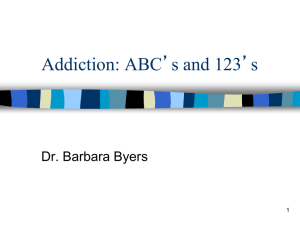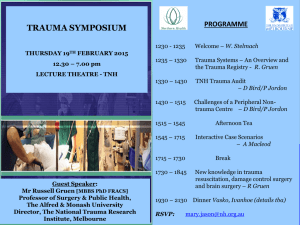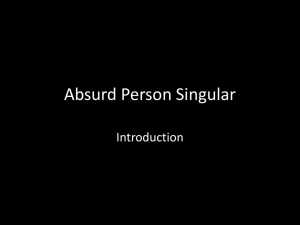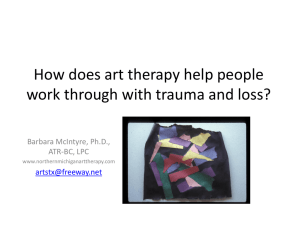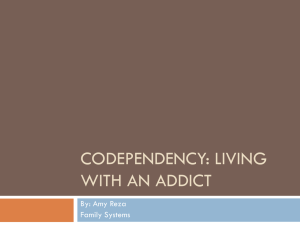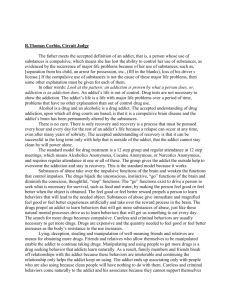Supporting Families Through The Trauma of Recovery
advertisement
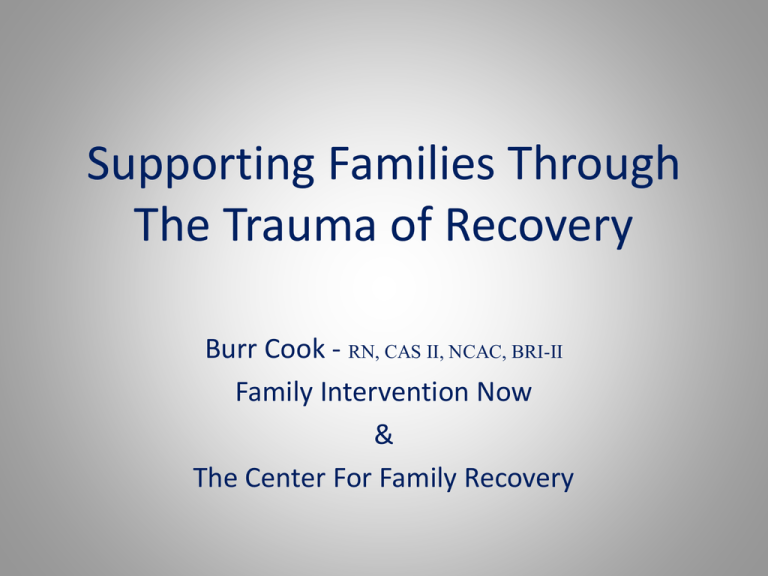
Supporting Families Through The Trauma of Recovery Burr Cook - RN, CAS II, NCAC, BRI-II Family Intervention Now & The Center For Family Recovery Stages of Recovery • Stage One: Drinking /Using Stage • Stage Two: Transition Stage-from drinking/using to abstinence • Stage Three: Early recovery • Stage Four: Ongoing recovery • Brown/lewis Characteristics of the Family Impacted by Addiction • • • • • • • • Pre-occupation/focus on addict/using Shame Denial Pre-occupied with “control” Inconsistency & Insecurity Emotional cycling to extremes Communication(none, indirect, looped, repetitive reactive/defensive) Interaction chaotic/avoidant FIN, Brown/Lewis, ACOA • • • • • • • • • Hyper-Vigilance/HyperSensitivity Unspoken Rules Doubting of Perceptions Fear of Normal Conflict Survival Roles “Open” Secrets Rigid Short-Term Crisis Focus Boundaries are porous within family/rigid externally Dominated by defenses/anxieties/ tensions / chronic trauma Anger Rage Pain Abandonment Co-Addiction.. Frustration - mistrust B. Maher-interventioncenter.com B Disappointment Shame Structure and Process in the addicted family system: • Rules: tend to be rigid, arbitrary and protective of addiction and core beliefs around the family's behavior. • Roles: generally inflexible, adaptive, serve to hold family and system together. • Rituals: generally include alcohol/drugs. With progression of disease, can be a source of “dread for families”. • Boundaries: overly porous, enmeshed within the family and rigid outside the family. • Hierarchies: In place, rigid- anyone who challenges drinking behavior is seen as disloyal, “less than” other family members. Brown/Lewis-FIN Structure and Process in the addicted family system cont.• Communication: Typically defensive/avoiding reality that might threaten denial. Underlying environment of fear discourages honesty/spontaneity . • Interaction: Can be tentative or confrontational-system ruled by impulse. Does not allow connection or separation. Members can experience both enmeshment and isolation, choice becomes of extremes. • Stability: tends to be unstable and inflexible and easily thrown off balance by unexpected or traumatic events. • Change: resisted at all costs, denial, anxiety and shame keep members gravitating toward what’s familiar. One or more members in system must break through denial and “hit bottom” before change can occur………………. Brown/Lewis-FIN Family Recovery Stage 1 (addiction) • Family Environment: Anxious, unsafe, chronic/acute trauma, tension, shame, chaos, emphasis on control (denial!), inconsistent and unpredictable • Family System: Isolated, chaotic, reactive/defensive inconsistent boundaries, unhealthy communication patterns, rules and roles subordinate to addiction-struggle for control • Individual: Maintains unhealthy beliefs, behavior and emotions to support the system, sacrifices individual development to preserve the family system Individual and family energy directed at maintaining denial & core beliefs, there is no problem, invent rationalizations/explanations for addicted reality and to cover up and protect family secret Family Intervention Now Stephanie Brown Tasks/Support: Drinking Stage 1 Family Member(s) Break denial “This is addiction (or co-addiction)” “It is out of control” “I/we are out of control” Brown/Lewis- FIN Supporting professional Support therapeutic alliance Support challenge of denial by acknowledging realities of addiction. Provide appropriate referrals Patience Family Recovery stage 2 (Transition - abstinence) • Environment: anxious, chaotic, “feels” unsafe, chronic and acute trauma- beginning of “trauma of recovery” • System: in a state of collapse, chaotic, may be highly defensive - shift towards external support (therapy, 12 step, family programs etc.) • Individual: shift from family focus to individual focus. Confusion, depression, fear, anger and abandonment. Intense feelings of loss of control. Dominated by impulses (“I want to divorce this family!....) • Family Intervention Now Stephanie Brown Tasks for transition • Break through denial • Realize family life is out of control • Begin and continue to challenge core beliefs • Allow addicted system to collapse • Shift focus from family to individual • Begin detachment and recovery for individuals • Enlist outside support • Education on addiction, codependency, enabling, healthy communication and boundaries • Learn new abstinent thinking and behaviors Brown-Lewis Treatment in Transition Stage Impatient treatment allows for the family and addict a break from the addictive environment. Focus shifts from preserving the addictive system toward family/ individual recovery. Personal growth is now possible as the family is detached from addict and has a chance to focus on themselves. Little or no contact during treatment until clinically indicated is advisable. Process of self discovery. Family Intervention Now LVRC Supporting families in the transition stage • Supporting professional needs to have a clear understanding of addictive system dynamics and the challenges individual family members face when making the transition to recovery. • A “vacuum” is created as the addicted system collapses- the trauma of addiction is replaced by the trauma of recovery. • External support can provide a systematic process for healthy growth and an anchor for the individuals in this traumatic period Brown/Lewis-FIN Transition Stage support: • Assess family Hx /dynamics • Education on addiction/co-addiction and it’s impact on family • Education on recovery and what family can expect-realistic expectations. Encourage patience –internalizing reality of transition takes time…. • Emphasize individual reliance on outside supports (AA, NA, Ala/Nar anon, family/children’s programs, therapy, workshops, tx. centers etc.) • FIN-Brown/Lewis Transition Support cont. • Continue to support in challenge of denial and self defeating core-beliefs/behaviors • Collaborate on strategies to re-direct impulses and reframe anxiety • Help member to identify triggers/explore choices & balanced responses to problem solving • Utilize and reinforce the “language of recovery” • Encourage working on “self” vs. “relationship” and support creation of individual boundaries to support self focus Brown/Lewis-FIN Stage 3: Early Recovery • Environment: hope mixed with tension and some anxiety, depression/confusion, moving from unsafe to safe • System: still chaotic, but moving toward stability and health. Recovery organizes the system; less dominated by impulses; Parallel recovery*/lives focused on external support (AA, Alanon, Coda, aftercare group, therapy) • Individual: New recovery identity, sense of self development and sense of recovery values, intense self-examination May still experience periodic depression/anxiety. Family Intervention Now Stephanie Brown Tasks for early recovery… Steady abstinence, new attitudes, behaviors and thinking becoming integrated – focus on individual development takes precedence over family system…... • • Cont. detachment/reduced focus on family Maintain close contact with external supports Cont. to learn and practice recovery language/ abstinent behaviors and thinking Stabilize individual identities: “I am addict/coaddict and I cannot control my using/the addict” Break denial over the past Maintain parenting responsibilities • Brown/Lewis • • • • Early Recovery Not typically as traumatic as the transition stage but…… Fear of relapse of addict/co-addict is common, Emerging emotions can cause feelings of loss of control “surrendering” feels superficial at first-can provoke anxiety, once internalized it allows recovery to take it’s coarse…… Old system still collapsed/collapsing-reliance on external support crucial…… Brown/Lewis-FIN Early Recovery Support • assist in exploring long term solutions/strategies over short term “fixes” • Communication/Boundaries workshops* • Help explore realities of drinking/transition stage (system, environment, thought, attitudes and behaviors)* • Explore realities of new recovering identity* • Reinforce use of recovery language/principals • Challenge attitudes/defenses/behaviors that threaten relapse Brown/Lewis FIN Stage 4: Ongoing Recovery • Environment: stable, predictable and consistent. Not organized or dominated by crisis or trauma. Supports abstinence; comfortable, secure and safe. • System: stable/healthy new system organized by recovery principals. Capacity for self and system focus- “I” and “we” without sacrificing either. (Sobriety without recovery = no system change, likely unhealthy). • Individual: stable individual recovery-behavior/identity secure. Capacity for interpersonal focus, combine “I” and “we”. Spiritual development; shift from external control to internal (higher power). Intensive self examination and development. Stephanie Brown Ongoing Recovery Tasks • Continue abstinent behavior • Continue and expand addict/co-addict identities • Maintain individual recovery program/12 steps – internalize 12 step principals-deepen spirituality • Work through consequences of addiction/ Co-addiction to self and family • Add focus on couple, parenting and family issue’s • Balance/integrate combined individual and family recoveries • Brown/Lewis Ongoing Recovery support While the need for professional ongoing recovery support may be minimal/unnecessary at this stage, family members experiencing ongoing problems with past or present issue’s/ trauma’s may need: Referrals to professional support when appropriate Support in challenging defenses-self defeating or unhealthy behaviors Encouragement to deepen self-exploration Monitoring for signs of relapse and re-evaluation of personal recovery program Brown/FIN Supporting Families Through The Trauma of Recovery Burr Cook - RN, CAS II, NCAC, BRI-II Family Intervention Now & The Center For Family Recovery



